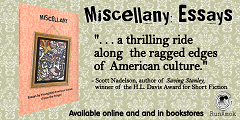Reason and Kindness
Language is not fixed.
The words we use and meanings those words carry change over time.
Part of being a conscientious human being includes adapting to language.
There is an old joke about Americans and language. What do you call someone who speaks three languages? Trilingual. What about someone who speaks two? Bi-lingual. What do you call someone who speaks one language? American.
As isolated as America is in its willingness to learn new languages, we are proficient adapters to the one language most of us speak.
I demonstrate this to my students all the time before we read literature written in dialect. In my classrooms, that list has included Huckleberry Finn, Their Eyes Were Watching God, A Clockwork Orange, and portions of Richard Wright’s short story collections.
When I ask students to write in the dialect of the lunchroom, they often write words that have never been spelled as they have spelled them before in the history of the English language.
One good example is “I’m-a.” This is, as in, “I’m-a be there.” Which is to say, “I am going to be there.” Students enjoy the exercise. And then, to pre-empt their complaints about why Mark Twain or Zora Neale Hurston is so hard to read, I ask them to take what they wrote and imagine that 100 years from now, someone is reading it.
“Would you want them to think you say things like, ‘I am going to be at the party this weekend, thank you,’ or ‘I’m-a be there, man.’ Which of those statements capture life as you know it?”
This helps students appreciate not only novels that contain dialect, but also the importance of how their words shape who they are. And if I can convince them of just how significant each word they use really is, I am doing my job.
While exactly how “I am going to” became “I’m-a” is a mystery, it is not a phenomenon. If you believe in platitudes like the only constant is change, then you only need only point to language as proof.
I wrote a fun little poem years ago while thinking about this.
How often
it’s forgotten:
words are what
we make of them.
They are not
nor ever were
supposed to rot.
They defer
to what is
popular.
Whether it
is twang or slang,
the drawl of y’all
is who we are.
Refinement
is how you
Define it.
I am on the topic of words because humanity needs some new ones at the moment.
I began compiling different blog posts for a collection. This collection I hope to release this summer, but we’ll see. I printed something that could serve as “chapter 1” and then I just started re-writing it from scratch. Words are fluid. So is memory, experience, and thought.
One advantage to looking over old blog posts is to enumerate what really matters to me. WordPress has me select categories and tags for posts. I don’t know the difference between the two, but looking back at the blog has yielded much different categories on the whole then the ones I’ve been using to sort my monthly posts.
I don’t really venture too far from a few core topics. Chief among them is the mundane, of course. The ordinary — the dull, even, and how what we take for granted as commonplace is wonderfully exceptional.
This blog hasn’t, to my knowledge, caused Miriam Webster to alter any definition of the word. It also hasn’t received such widespread popularity that book agents are emailing out of the blue to sign contracts. What has come about (on my end, at least) is an occasional email of support. Every now and then someone writes to me that this blog has made a difference for this reason or that. And that is exactly how it should be.
How could this blog truy thrive otherwise?
What I mean is, if I am going to flaunt that making small and integral changes in the way we see things is of monumental importance, I had better accept every small and integral change that comes about as a monumental achievement.
That’s not easy.
But I’m working on it. And I thank you for your patience and support as I experiment and refine my role as a writer. And please know that your small tokens of appreciation—always in the form of words—are a really big deal to me.
We need new words to describe what we’re going through.
The world is in a bad place. As for our family, I’ve tried to keep all our plates spinning. We haven’t had to withdraw support from anywhere in our community. And I’ve tried to encourage others to do the same. I have embedded my simple line of reasoning into my conversations with folks: With all the difficulties people are facing, I want to do all I can to make my interactions with people easy and kind.
That, too, is not always easy.
But simple reason and basic kindness tell me that when the world is chaotic, I need to show calmness. When the world is distrusting; I need to demonstrate faith. When the world is falling apart; I need to help stitch it back together.
What good is it to further any divide between human beings? The righteousness of victories based in ego are hollow, empty. And they are ultimately unsatisfactory and unacceptable in our souls.
I’m looking for a word here. I promise. Let me get to the point in the 100 words I have left with you today.
If I am left alone to determine what matters, then all that matters is if my side wins.
When what truly matters to me is you, all sides dissolve.
I have only experienced this blissful dissolve in the company of my fellow human. When I get close to others. When I listen. When I share what I think and trust I am being heard.
We used to call this conversation. And conversation used to be mundane. How about this weather, friend?
Nowadays, conversation feels more like a radical act of faith.
There are many reasons why we stopped listening to one another, but there is only one reason why we should start to listen again: it feels good to heal.
Really good.
In fact, to heal from defeat feels as good as to bask in victory — in both instances, you stay in the game. And if you’ve never felt the satisfaction of healing, then defeat will feel even better to you.
And what of those that refuse to accept defeat? I pray for them. For they are the same ones who never felt the true satisfaction of victory in the first place.
And what of those who refuse to listen to the defeated? Their victory is not worthy of the mundane act of asking a neighbor about the weather.
I still haven’t found the word I’m looking for. But I always appreciate the words you find in reading me.
Until next month, side with reason and kindness, for neither require victory to prevail.

 Previous Post
Previous Post Next Post
Next Post












Mark, Great post! You’ve got me thinking, a couple of my favorite words are refuse, deliberate, and appropriate, due to their context-dependent nature
Beautiful
Mark, I love what you write. You mirror my own life and from one Mark to Another I appreciate your view, growth and open mind. Your a work I progress and you inspire me to be the best I can be. Thank you for your observations.
Topics to consider
Newton 3rd law
Mark 11:24
The Secret
Photo synthesis
Yin and Yang
The Phoenix
Thank you,
Mark Goodson
🙂
I love your words.